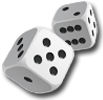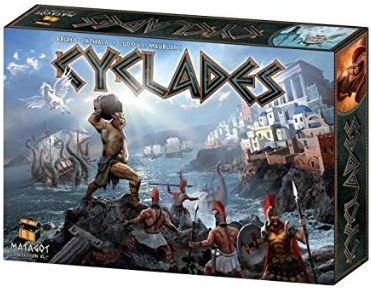



play board games
Board game reviews, strategy tips & session reports
Cyclades Board Game Review
 Stats:
Stats:
No. of players: 2-5
Amount of time to play: 90-120 min
Age requirements: 13+
Set-up time: 5 minutes
Cyclades is a board game about winning the favor of the gods so you can control two metropolises and win the game. You must bid wisely to get the actions you need or keep your opponents from getting the actions they need.
Cyclades Rules Description:
Cyclades has a modular board that changes size based on the number of players. The board is made up of island and sea spaces. You win by building two metropolises on your islands and make a metropolis by building a set of four different buildings.
At the start of each turn you get your income based on the number of cornucopias you have on the board. Each player’s starting position gives them two cornucopias and you start with five gold.
Next you shuffle the god tiles and place them on the board. The gods include Zeus, Ares, Poseidon, Athena and Apollo and each lets you take an action and buy one type of building. Then you bid. You may bid on any of the gods you like, but if you are outbid you must bid on a new god. You cannot outbid the player for the god you were just on. After every god has a winning bid, you pay and the player that won the favor of the first god tile goes first.
Zeus lets you gain a priest for free. And you can pay one more to buy one more. Each priest card you have lets you pay one less when you bid on a god. He also lets you buy a temple which makes buying mythological creatures cost one less. Zeus can also discard a mythological creature for one gold. I’ll get to the mythological creatures in a bit.
Ares gets you one troop and lets you purchase up to three more. They are placed on islands you control. He grants you the option to buy a fortress. A fortress gives the island it is on one extra defense. Ares also lets you move and attack with one group of troops for one gold. When moving to another island you have to have a chain of ships to get you there. They act like a bridge.
Poseidon gets you one ship and purchase up to three more. Your ships must be placed next to islands you control. He also lets you buy a port. The port gives you ships adjacent to that island one extra defense. For one gold you may move a ship (or group of ships) up to three spaces.
Athena lets you recruit up to two philosophers. The first is free but the second costs four gold. Four philosophers turn into a metropolis. She also lets you but a university. The temple only contributes to build a metropolis.
Apollo is not one of the tiles but is printed on the board. You do not bid on him but instead get one gold. And the first player to place their bid token there gets a cornucopia to add to the board.
On your turn you use your god’s action and may purchase a mythological creatures. The mythological creatures give you a one-time special ability that is used when you buy them. Some abilities last until your next turn and others are more immediate. You can be immune to attack for a turn, destroy a building, or steal a priest, philosopher or gold from an opponent.
Combat is pretty straightforward. You roll a six-sided die with the numbers 1 through 3 on it. You add that and any bonus you have from fortresses or ports to your number of units. The player with the lower total removes one of their units. You can retreat or keep battling until one player’s forces are eliminated.
Quick Review of Cyclades:
Cyclades is a great auction game with some fighting. It blends some great elements from Eurogames with fighting and direct conflict. It is easy to teach and play but experienced players will have an advantage over new ones.
The components for this game are great. The art looks good and the components are well made. There are nice-looking miniatures for some of the mythological creatures too. The rules are well written and easy to follow.
There is a lot I lie about this game. First the way the auction works is fantastic. Not being able to bid on the same god once you are outbid adds an interesting element to bidding. You don’t want to bid too much but if you get outbid you may not get to take the action you want.
Next the way the god tiles come out and shift each round creates some fun tactical decisions.
For example you bid on Poseidon to cut off the player bidding on Ares from attacking you by attacking their ships and breaking their path to you. There are just so many ways this affects the game and creates tension as they are shuffled and placed.
The mythological creatures can be really good. In fact the more you play, the better you get at using them. They can really save you from defeat or help propel you to victory. How useful they are depends on what is available to buy. But that makes Zeus’ discard ability s important. I have seen a few games where players go digging for a specific creature for the win.
I like that fighting matters but isn’t overpowered. You don’t even have to fight but it can help you if the situation is right. Combat just feels really balanced within the game.
Since everything except gold is public knowledge it is easy to determine the game state. This might frustrate some players, but it doesn’t bother me. It does lead to a lot of table talk and gang up on the leader situations. But the game is so tight that the leader changes quickly and it gets to a point where anyone can win on the next turn.
Cyclades is one of my group’s favorite games. I really enjoy it and highly recommend it. It has meaningful decisions, great mechanics and is well designed. I think everyone should try this game and that most gamers should have it in their collection.
Score and synopsis: (Click here for an explanation of these review categories.)
Strategy 5 out of 6
Luck 4 out of 6
Player Interaction 6 out of 6
Replay Value 5 out of 6
Complexity 4 out of 6
Fun 6 out of 6
Overall 6 out of 6

Leave a Reply